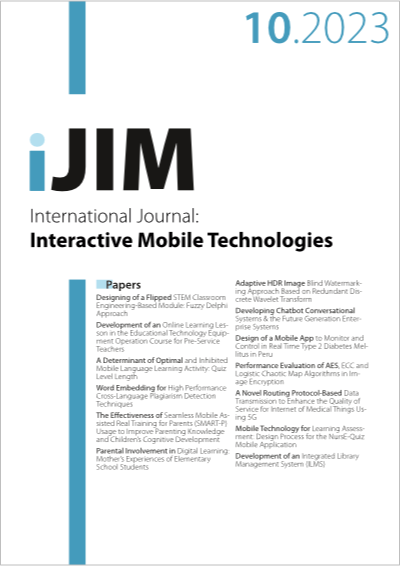Designing of a Flipped STEM Classroom Engineering-Based Module: Fuzzy Delphi Approach
DOI:
https://doi.org/10.3991/ijim.v17i10.38217Keywords:
Problem-solving skills, Fuzzy Delphi Method, Merrill’s first principles of instruction, flipped classroom, primary studentsAbstract
Abstract— The National Innovation System found that research in Jordan did not contribute sufficiently to economic growth and to solving real-world challenges, particularly those related to STEM (science, technology, engineering, and mathematics). This was attributed to several reasons, including the inability of educational curricula to guide students in dealing with real-world issues. In addition, education in Jordan is content-intensive and primary school children lack the time to build functional competencies such as problem-solving. Therefore, it was necessary to adopt an approach allowing students to learn the theoretical content on their own while allocating class time to practice problem-solving activities with their teacher and peers. To address this gap, this study aimed at designing an engineering-based module for a flipped STEM classroom to aid grade seven students in developing their problem-solving abilities based on Merrill’s first principles of instruction as an instructional design model. To generate the module components and aspects, semi-structured interviews were performed with 9 subject matter experts. Then, 29 experts responded and offered a consensus on what was reached in the previous interview. A total of 36 items were discussed by the expert panel using the Likert 7-point scale in the fuzzy Delphi approach. The five-module aspects namely; the form of STEM integration, the assessment, the resources, and the pre-class and in-class instructional activities, were determined. This research will usher in a new era for the Ministry of Education. in planning and teaching integrated STEM disciplines in line with Jordan’s vision 2025 to equip all learners with 21st-century skills such as problem-solving to enhance education standards to international levels.
Downloads
Published
How to Cite
Issue
Section
License
Copyright (c) 2023 Khadijeh Naser, Sherin Alamassi, Zuhrieh Shana, Jihan Yousef, Siti Hajar Halili

This work is licensed under a Creative Commons Attribution 4.0 International License.



